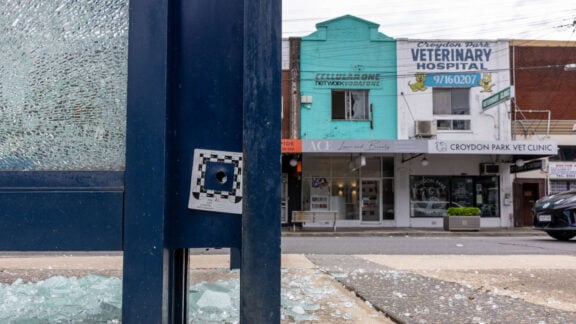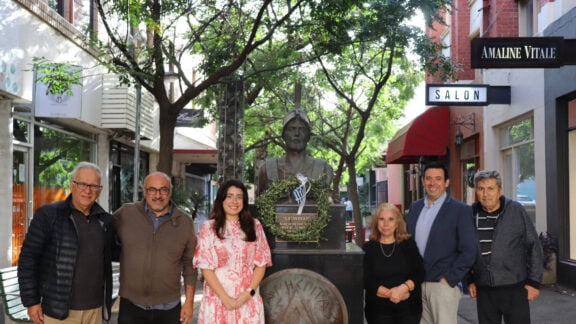It takes a certain kind of mindset to get to compete in a Marathon. It also takes hard training, resilience, determination, willpower and patience. It takes ten time these qualities, along with many more to be able to participate in a trail marathon. On a mountain. At a centuries old trail associated with a cultural landmark. Stavros Michael possesses these qualities. Most of all, he has the drive and dedication demanded and the eagerness to take on any challenge.
A couple of weeks ago, the young Melburnian (who is the son of Federal MP for Calwell Maria Vamvakinou and LaTrobe Research Fellow Dr Michalis Michael) competed at the Inca Trail Marathon to Machu Picchu, finishing sixth, in 9 hours and 36 minutes.
This had not been the first time that he had found himself at an ancient trail. A dedicated runner for a decade now, Stavros Michael has developed a passion for Marathon running four years ago; he has competed at the Melbourne Marathon four times and also at the Great Ocean Road, but the turning point for him was when he run on Mount Olympus in Greece, at the annual “Running with the Gods” marathon.
“Trail marathons are different than the others,” he says. “They challenge you not only physically or mentally but also spiritually. I find something very peaceful about being in nature and exploring different things in the world.”
After Mount Olympus, it was the Great Wall of China and now Machu Picchu. “I did a bit of research to find which is the most difficult marathon and the Inca Trail Marathon came up, so I thought: why not? It’s a challenge that caught my eye; it was something that I couldn’t shake off,” he says. “Knowing that I could complete the world’s most difficult marathon would be a great achievement for myself as a runner.”

In reality the Inca Trail proved to be an even bigger challenge. “It was probably ten times harder than I imagined,” laughs Stavros, remembering finding himself at Cusco, a village standing at 11,150 feet (3,4 km) above sea level, four days before the marathon.
“I didn’t imagine it being so high in altitude. I wasn’t used to it, so I developed migraines and I was feeling out of breath, but I was able to adapt,” he says. The trail itself reaches even higher altitudes of almost 14,000 feet (4,25 km), but this was not the only challenge it presents. The most important was that the path itself does not exist.
“There is no path, there are stone hedges and stairs that were built centuries ago,” Stavros says, describing a trail full of loose rocks, increasing the risk to trip. “We started at 4 am and for the first three hours, you could not see more than three meters ahead,” he adds.
How does one prepare for all this? “You can’t really prepare yourself,” he says, pointing to the vast difference between that environment and training at an urban setting.
“The best I could do was to stick to my own training schedule, keep building my fitness as best as I can and go to those marathons head first. That’s the only way.”
Standing at 8,000 feet (2,4 km) Machu Picchu is, of course, one of the world’s most significant cultural heritage monuments, offering a breathtaking sight, that everyone should aspire to see in their lives. Yet, when Stavros Michael shuts his eyes and thinks about running there, it is not the Inca civilisation monument that comes to mind. “It’s the people,” he says.
“The most friendly, generous people I’ve ever come across. They ‘ve got no English background but they still try to help you with whatever you ask them.”

Once back from Machu Picchu, Stavros went back to his normal life and his work at the Commonwealth Bank, where he’s pursuing a career as a lender for investments and home loans. Has the marathon experience given him any transferable skills? Has it influenced him as a professional or a person in general?
“Most definitely,” he says. “It’s helped me develop more patience, focus on the task at hand and also just be grateful for the moment I’m living in instead of thinking about the future. That kind of marathon, which goes for more than 10 hours, takes patience; you need to put yourself in a mindframe where you’re not stressed about time. And that has helped me with my work, to make sure I’m focusing on quality instead of rushing stuff.”
In the end, marathon running is all about being in the moment.
“While I’m running, I’m thinking: ‘What have I done? What have I gotten myself into?’ But then you get into your own world, you appreciate where you are, what’s around you, and every breath that you take. Your focus is on making sure you don’t trip, so you got to concentrate the entire way. Afterwards, it’s an indescribable feeling. You have accomplished something that you’ve worked on for so many months; it’s finally done and you’re just on cloud nine.”
Now that it’s all behind him, how does he rank this experience, compared to that of the Wall of China and Mount Olympus?
“I’ve gone through each marathon without knowing what to expect each time,” he says.
“They all surpassed my amazement. Machu Picchu was harder, but Mount Olympus is my favourite. Even though I’d never been there before, it felt very familiar. The sense of comfort of being in Greece, in a country that is embedded into my blood, gave me the confidence that I could complete this marathon without any stress.”
So what is next for him? Apparently, it all depends on Maria Vamvakinou.
“If my mother lets me, it’s Mount Everest, but if I mention it to her, I will probably have to find a new place to stay,” he laughs, before adding: “So, Mount Fuji in Japan is the one I’m looking at, right now.”










